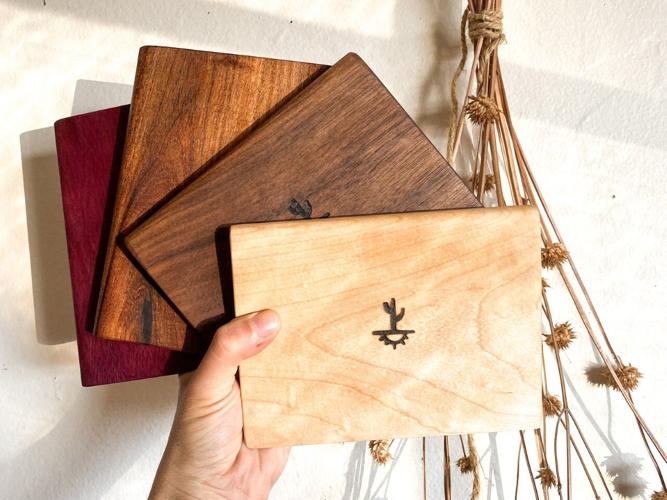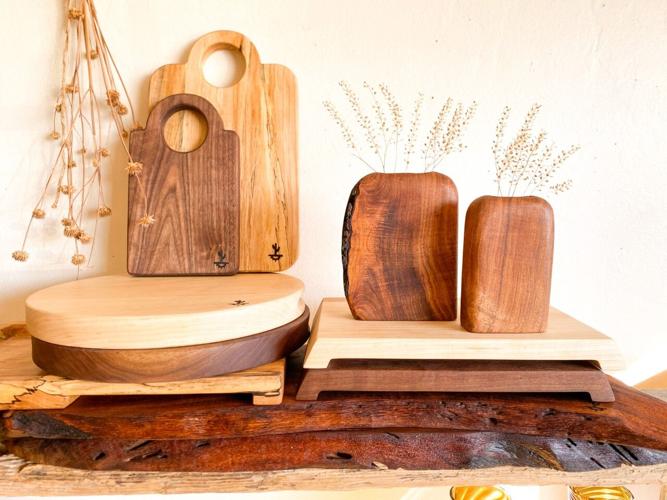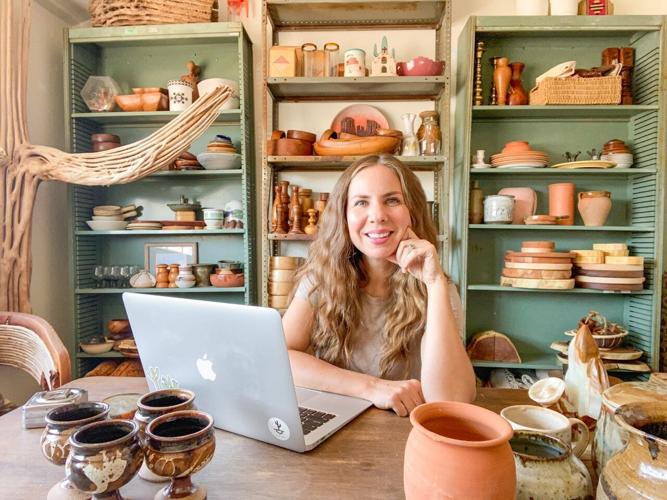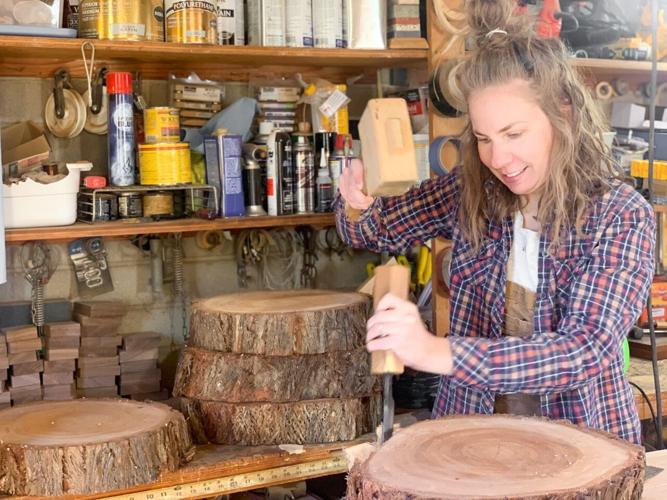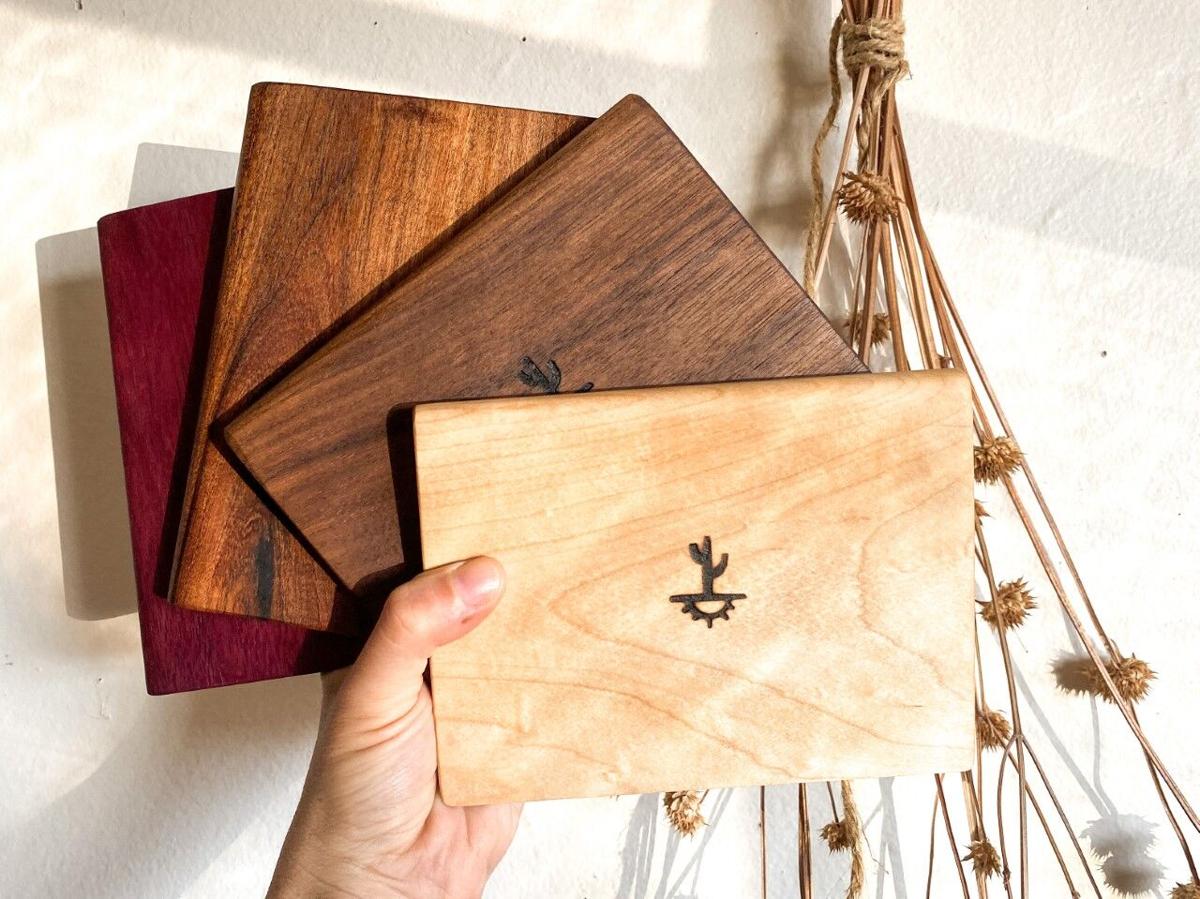Emily White has spent the last two years designing and crafting wooden houseware items with a tiny touch of Tucson for her online shop dubbed “La Vida. Taprūt.”
A small cactus silhouette, with roots beneath it, is delicately stamped into many of White’s designs including the cutting boards, paddles, catchalls and even wooden bench scrapers.
As a native Tucsonan, White has always been inspired by the beauty of the Sonoran Desert’s cacti, sunsets and wildlife. Over the last two years, her love of the Old Pueblo has been reflected through her handcrafted items.
“The Sonoran Desert is just so unique and so beautiful in its own way and just nothing else feels like it,” she says. “It's definitely home.”

Some of the cutting boards and risers from “La Vida. Taprūt.” made by local designer Emily White.
While White’s designs are crafted with Tucson in mind, she also keeps another important element at the heart of each project: functionality.
“I want them to pick up a piece and put it in their home in a way that's like, (it’s) a beautiful piece, but functional in some way that makes them excited to be in that corner of their home or in that room,” White says. “It could be something as simple as a little bowl that's holding all of your limes and lemons and you're about to make a cocktail. So then you get to look at that beautiful bowl that you picked out and it makes that whole moment feel a little extra special. … So that makes simple, everyday moments very intentional and special. That's what I want to come out of every single sale.”
White experienced that exact feeling when she began switching out the bowls and spoons in her own kitchen, replacing them with handcrafted items from local makers.
As someone who wasn’t the biggest fan of cooking and often said it felt more like a chore than a hobby, the switch made the world of a difference for White.
“I started slowly, just putting things in my kitchen that I thought was pretty but functional,” she says. “And then I was excited to use those things, I was excited to use these little pottery bowls that stacked on each other and the special wooden spoons that I got from a local maker. … And now I just cook and I love it because I'm surrounded by all these things that I've been curating for years. The kitchen is now my favorite space in my home to be in. And it was the most simple thing to change — the pieces around you. And it's the easiest thing to change, too. So, that's what I want to help other people feel.”

Emily White, owner of La Vida. Taprūt. poses with some of her online shop items including vintage items and wood houseware items.
From thrifting to woodworking
Although Taprūt is now well-known in the community for its wooden cutting boards and more, that hasn't always been the case.
White’s passion for handcrafting wooden houseware items is a recent love that she picked up during the height of the COVID-19 pandemic two years ago, when she had to pivot Taprūt from a vintage houseware shop.
Before the pandemic, White would spend her days scavenging through local thrift stores and estate sales for vintage home items to sell in her online shop, which she initially opened in 2017.
“COVID hit and I couldn't thrift, I couldn't keep my shop stocked and I felt like I couldn't take the pause and survive this,” she says. “I just thought that my shop would maybe disappear. So I shifted gears and had my brother teach me woodworking and that took off way more than I could have ever expected. And now that is more of the front of my business, especially during the holidays, it's all woodworking. I'm more of a maker now than just a reseller. So, it's kind of life-changing.”

Emily White working in "La Vida. Taprūt.'s" workshop.
White is the mastermind behind each Taprūt design, but her brother Bryon is the “math” behind the design, she says. Without him, some of her unique designs like risers and bench scrapers may not have come to fruition.
Since her brother works a full-time job, he helps out on his off days. But White is primarily crafting the wooden items herself as of late.
One of her favorite creations is the mesquite boards that she handcrafts from rugged pieces of locally-sourced wood from her “mesquite dealer,” she says.
“I also have people that will call me up and say, ‘Hey, I have this log, do you want it?’ and then I'll go pick up the log and have it milled,” White says. “The mesquite always has a backstory, so my dealer will also tell me where it came from. So, you could point to any mesquite piece in my shop and I would be able to tell you exactly where it came from and how long ago it was chopped down. And that's what makes the mesquite pieces so special. And that’s probably why it's my favorite.”
Despite White being the head of Taprūt, it wouldn’t be possible without her massive support system — or as she calls them, her “village” — that helps keep the shop running, stabilizing her work-life balance. Taprūt’s additional helpers include her husband who packs up all the heavy houseware items for local markets, her assistant Amber who handles the e-commerce side of things, her friends who offer moral support and, of course, her parents who house Taprūt’s woodworking shop in their backyard.

Emily White is the owner and creator of "La Vida. Taprūt," an online vintage and wood houseware item shop.
A dream that led her back to Tucson
Taprūt has been a dream years in the making — literally since her middle school days.
After graduating from the University of Arizona with a degree in consumer sciences, White worked in retail like malls and even a local boutique, but always aspired to have something of her own.
“It's always felt like I needed to be putting my own energy out there in some other way than working for someone else,” she says. “Then I discovered reselling vintage found pieces and that's how this whole shop started and then it kind of changed a lot over the years.”
Following a brief stint in New Mexico, White knew that she had to come home to Tucson and open up her own shop.
“I only lasted nine months,” she says. “I just missed home so much. I missed the desert feeling. And that's when I knew that I wanted a shop of some sort that celebrated the desert.”
All of White’s creations display her rustic and desert-inspired aesthetic in some way, whether it be from a rugged piece of mesquite, earth-toned pottery vessels or the hand-painted wrapping paper that she wraps all of her orders in.
She's has always had a passion for interior design and home decor, but her signature style wasn’t always her trademarked look. She enjoyed vibrant colors and patterns from designers like Ethan Allen and Jonathan Adler, which is a drastic contrast to her current-day style that’s influenced by the Sonoran Desert.
Even before White opened up her shop, she already had the name picked out: “Shop. Taprūt.” A play on the word "taproot" with a logo featuring a Sonoran Desert twist.
“I did this thing where I just sat down and started writing words and drawing. For hours. I just had to get a name. And then I was like, ‘Once I have a name, everything else will fall into place.’ And sure enough, that's what happens. … I wanted something that, to me, represented the root system of the saguaro,” she says. “And that's how my logo plays in. Everyone is like, ‘Oh, it's an upside-down sun.’ Yes, it is. But it's also supposed to be the root system of the saguaro, but in a very, like, tribal, almost geometric way. And Taprūt, I thought, stuck out to me, because the root system of the saguaro is so unique and the taproot itself is almost the same length as the saguaro.”
Once the shop began adding more handcrafted wooden items into the lineup, White rebranded from “Shop. Taprūt” to “La Vida. Taprūt.” to represent the new lifestyle items.
“I decided I needed to rebrand a little bit and I wanted to drop the ‘shop’ and make it so that it was more lifestyle,” White says. “And that's how I came up with ‘La Vida.’ So ‘la vida’ translates to ‘the life’ in Spanish and I thought that was a fun play on words again.”
As Taprūt has continued to grow over the last five years, so have White’s dreams for the shop.
For now, you can just shop Taprūt online. Eventually, she aims to open a storefront or studio where people can shop the wood and vintage collections in person and even set aside designated hours for dinner parties and other gatherings all under one roof.
“Just things that people can come and eat and drink and enjoy each other's company and shop and get inspired and just be surrounded by things that make them excited to try and do in their own home,” White says. “I think the people that follow me and like what I do is because they get the same feeling that I do when I pick up a wooden bowl, or when I seal a board and this beautiful grain appears. And it's like, ‘Oh my gosh, it’s so beautiful, like the natural beauty of it.’ People are excited about that, too. And that's what I want to share.”


